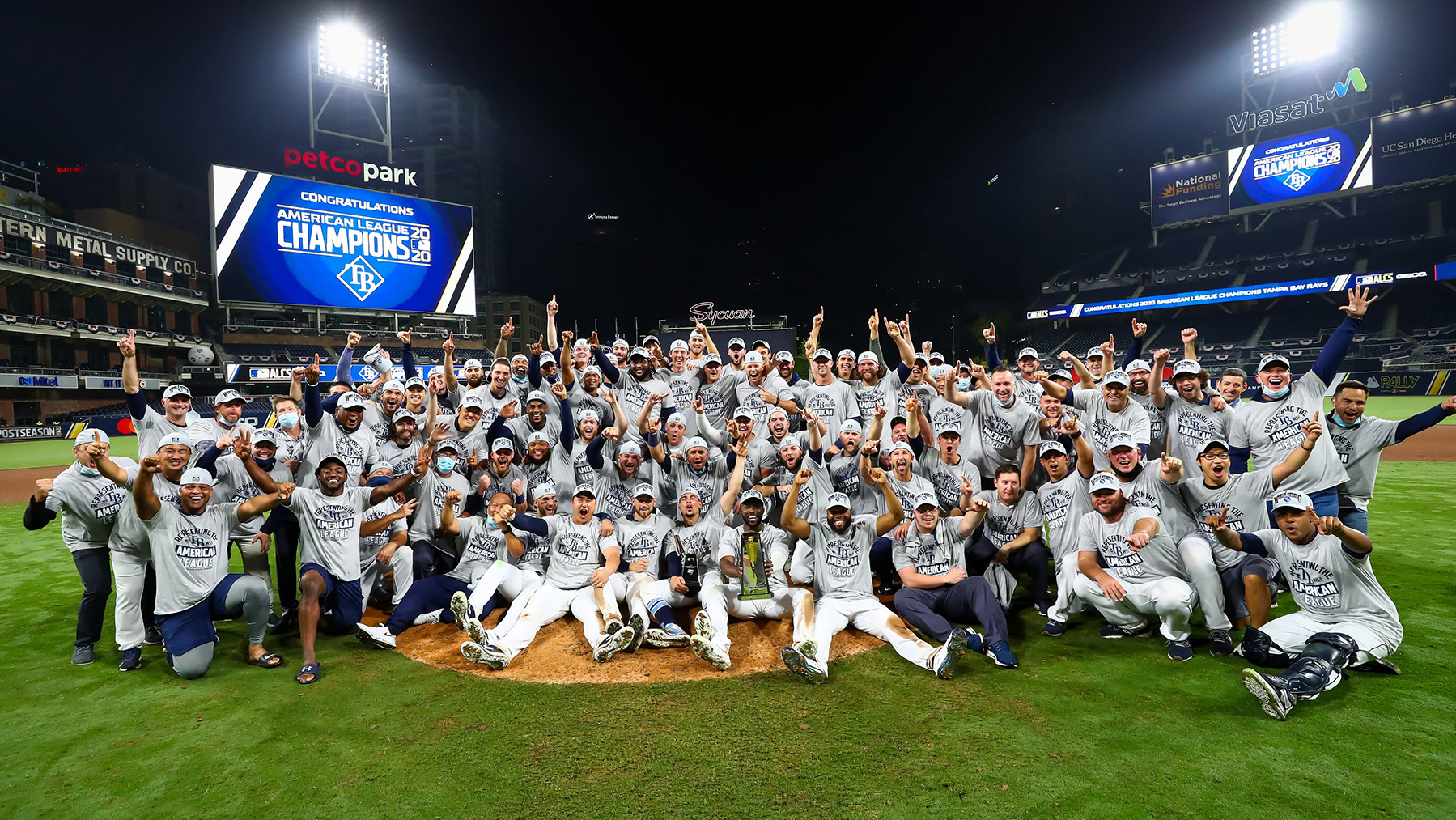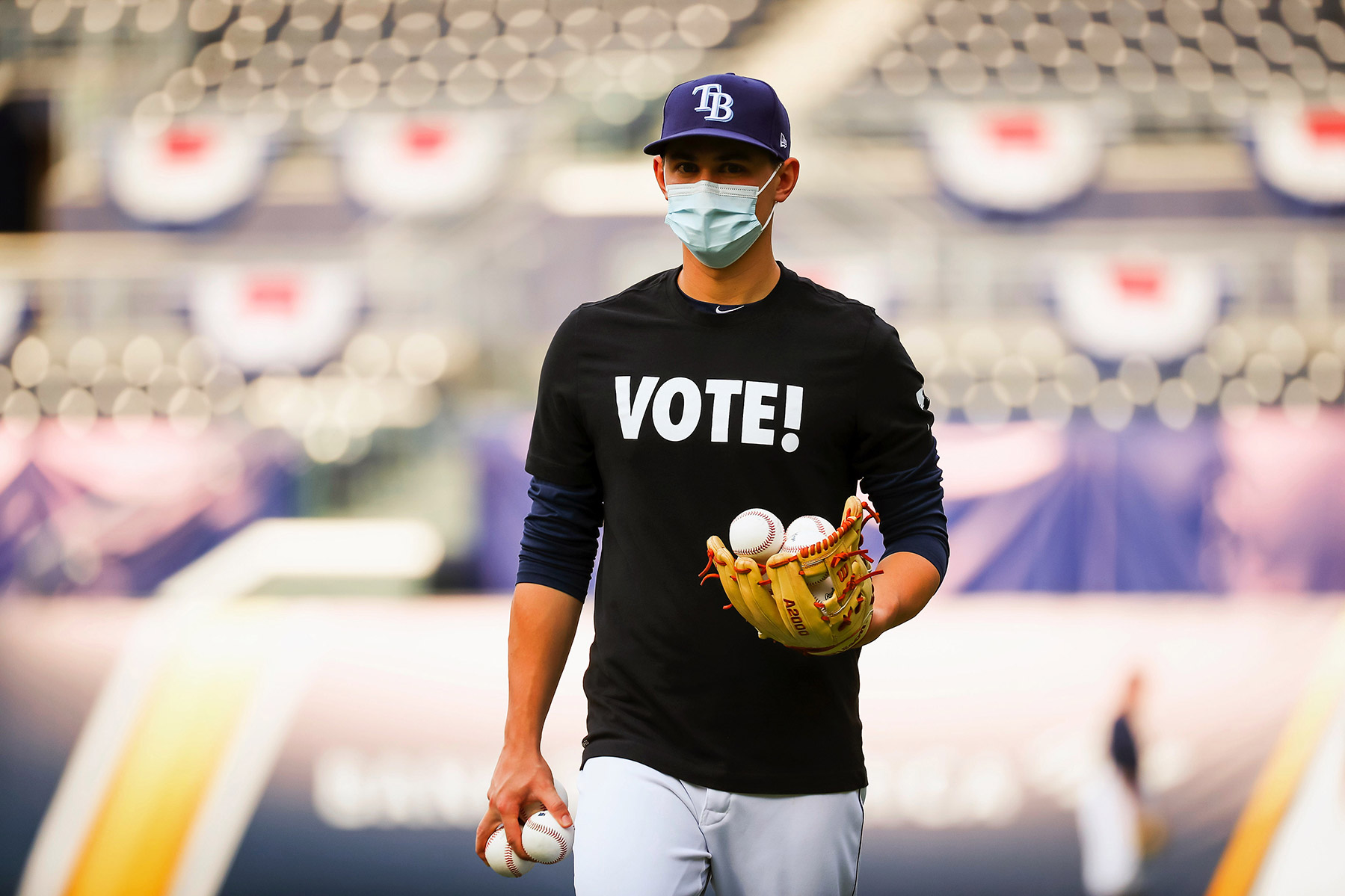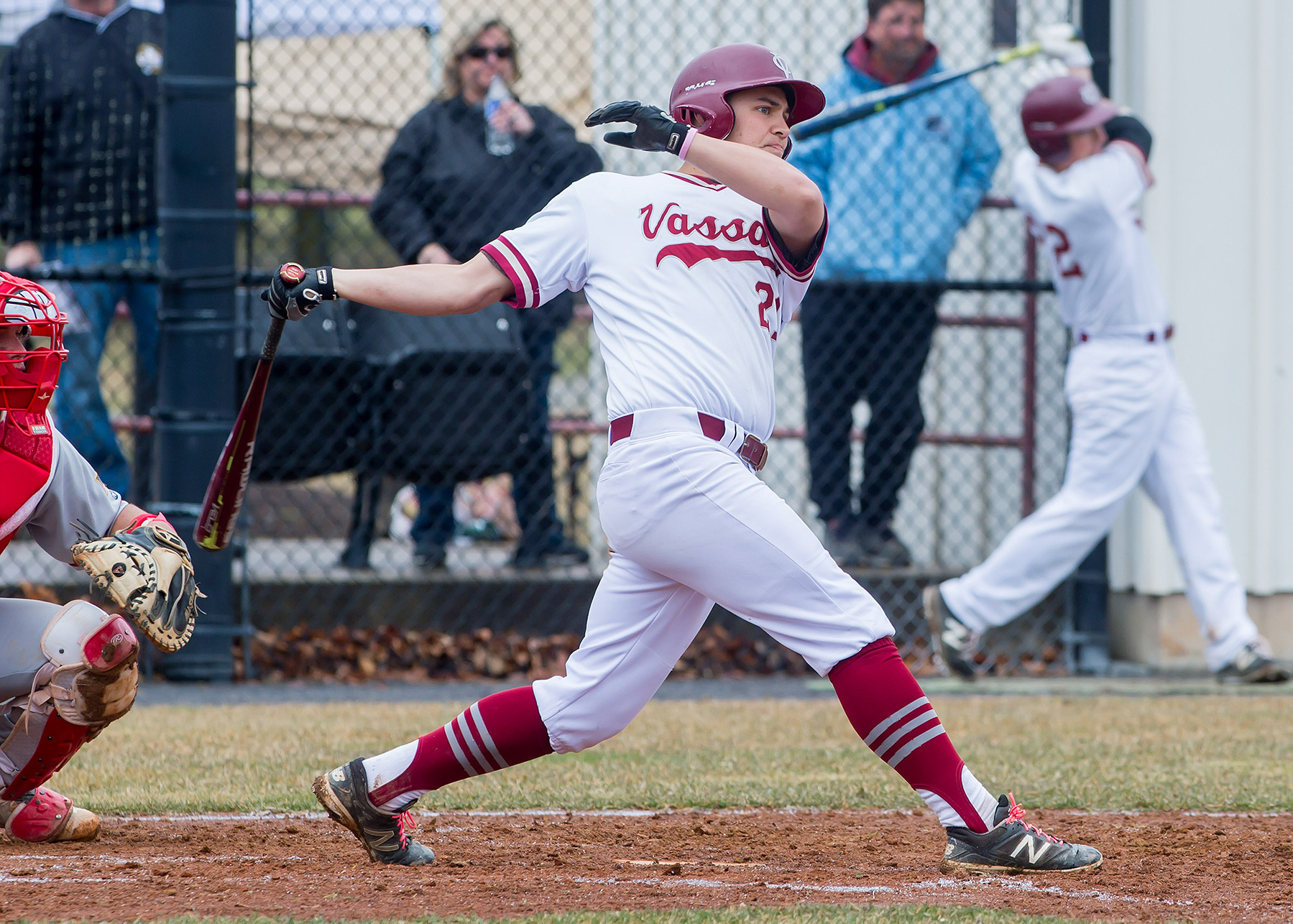From Poughkeepsie to the Big Leagues: How Bobby Kinne ’18 Carved His Path to the World Series
From Poughkeepsie to the Big Leagues: How Bobby Kinne ’18 Carved His Path to the World Series
It is Game Five of the World Series, and the Tampa Bay Rays have runners on first and third with two outs in the bottom of the fourth inning. The runner on third, Rays left fielder Manny Margot, breaks for home and Los Angeles Dodgers catcher Austin Barnes applies the tag. Margot is called out—and there watching it all, is Bobby Kinne ’18.

As an assistant in advanced scouting and replay for the Rays, Kinne spends each and every game behind the dugout, his eyes quickly scanning a multitude of screens that show him every conceivable angle of the game. It is his job to scrutinize every play—like Margot’s potential game-tying attempted steal of home—and decide within 20 seconds whether to pick up the phone and tell team manager Kevin Cash to challenge the call.
Many who saw the play felt Margot was safe at home and the Rays were foolish not to challenge the play, but Kinne sat behind his screens with the definitive angle showing Margot out at home. Had he picked up that phone, the Rays would have lost their second challenge of the game.

Three innings earlier, in the top of the first, Kinne did pick up the phone. Dodger shortstop Corey Seager was on first base and broke for second after a wild pitch. Rays catcher Mike Zunino scooped it up, fired a throw into the glove of shortstop Willy Adames. Seager was ruled safe at second.
“I challenged it,” recalls Kinne. “I thought for certain Seager had been thrown out. Zunino threw him out, Willy (Adames) made a good tag. We had a definitive angle screen shot, and he was out. It came back that the call stood, which means the umpires and replay in New York couldn’t decide, which was pretty devastating because that run scored and it was a big momentum swing.”
Kinne explained that his job requires viewing each play from two perspectives: risk threshold and play leverage. He has to consider a range of circumstances before deciding whether or not to challenge a call. This past season, less than two years after graduating from Vassar, he was applying his knowledge as the Rays competed at the pinnacle of the sport.
“To be at the World Series, it’s surreal and by far the most special athletic experience I’ve ever had, despite not actually playing,” Kinne explained. “It gives you an appreciation for how difficult it is to reach that point and how much sacrifice it takes from every individual on staff and on the roster to get there.”
How did Bobby Kinne get from Vassar to the World Series? Following a four-year career at Vassar, where he was a four-time All-Liberty League selection for the Brewers, the Great Barrington, MA, native had a firm grip on the two different realities: working or playing in Major League Baseball.

“I knew my senior year that I wasn’t really good enough to keep playing baseball, but I also knew I didn’t really want to be away from baseball. I wanted to work in it and use what I’d learned at Vassar to be involved in the game,” Kinne shared.
To break into a professional sports organization like Major League Baseball one doesn’t simply submit a resume and wait for a callback. It takes work and connections. Fortunately, for Kinne, Vassar had the connections he needed to get his foot in the door.
Kinne’s connection was Paul Mifsud ’95, Vice President, Head Baseball Operations Counsel for Major League Baseball. After a trip to Vassar’s Career Development Office, Kinne was connected with Mifsud, who invited him to New York City and laid out a road map on how to get hired in a front office.
“Without Paul, there’s no chance I have this opportunity,” stated Kinne. “He was instrumental in teaching me how to communicate with these people—what they’re looking to hear, how and when to reach out. Without him and his guidance, there’s no way I would have had the interview setup that I did and doors opened for me.”
Those doors began to open as Kinne entered the latter half of his senior season, after he received a questionnaire sent by the Tampa Bay Rays. Following several rounds of intense questions, including one where his answer was, “I don’t know, but I will find out and I’ll learn”—Kinne advanced into the next round of the hiring process at the MLB winter meetings.
“I remember it was finals week and I had a heavy dose of papers during study week,” Kinne recalls. “I finished my papers, flew to the meetings, did around 12 interviews, and flew back to Vassar. The next morning I took a final exam, got in my car to go back to the Town Houses and got a call that I got a job with the Rays.”
Just four days after his May 2018 graduation, Kinne and his dad made the long trek to St. Petersburg to get him settled. A quick turnaround from college student to entering the professional world—he describes it as “a definitive surrendering of my youth.”

His first job with the Rays was about what you would expect for a general intern: small tasks like data tracking during games, writing up quick scouting reports, filing data, and, of course, getting lunch for the office staff.
“It all started as a three-month summer internship on the back end of the 2018 season,” Kinne explained. “I was fortunate enough to just observe, ask questions, and learn. I think I annoyed a lot of people, because I asked a thousand questions, which was the right attitude to have as they asked me to come back at the end of the season.”
As Kinne progressed into his second internship with the team, his duties shifted to advanced scouting, which allowed him to help prepare reports and scout the teams the Rays would be playing in any given series throughout the year. Those reports would then land on the desk of Kevin Cash, Tampa Bay manager—the 2020 American League Manager of the Year—to use as he saw fit for planning.
Kinne had used his persistence to land the job, and he continued to work hard to move up the ranks. When a vacancy opened up in the organization, he applied and learned the skill sets necessary to give him a chance to land a full-time position within the organization. After numerous emails to the director of personnel development, a golden opportunity arrived.
“My boss, Jeremy Sowers, traveled with the team doing replay,” Kinne explained. “He wanted to get off the road to be with his family more. Since I did advanced scouting, I knew I could add value and that being on the road with the team would be an incredible experience. I read through the rule book and learned replay strategy, but in the end, they told me they were hiring someone else.”
Kinne’s persistence and dedication to the organization paid off on June 10, 2019. While he was on an office lunch run, the director of personnel development called him to her office. Circumstances with the replay position had changed and the team asked Kinne to fill the role.
“She asked, ‘Do you have a passport?’” Kinne recalled. “I told her no, and was basically told I’d need one. She said, ‘You’re going to be traveling now, the replay job is yours, and you have a meeting with Kevin Cash in an hour.’ I was dumbfounded. She told me that a locker was being prepared in the clubhouse for me, wanting to know my shoe and hat size. It was surreal.”
Kinne says his experience as a Division III student-athlete was critical to his success after college. It taught him to appreciate hard work, build motivation to succeed, and push him to improve upon his passion.
“You’re doing everything because you truly have a genuine passion for it,” he said. “You’re not just climbing the mountain to plant your flag; you’re trying to embrace the hike along the way. That’s what attracted me to Vassar and what led me to an organization like the Tampa Bay Rays.”
“The Division III experience teaches you to focus on proper incentives and proper motivation,” Kinne explained. “So when you do get tested, when times really do get tough, you can pull from a confidence and well of good intention rather than empty promises of success and fanfare or attention.”
It is that motivation that has been a driving force for Kinne since his days playing with the Brewers. Being a Division III student-athlete taught him motivation must be internal. Creativity and an ability to solve problems in different ways were some of the traits that propelled him from student-athlete to holding a job in professional baseball.
“When I first got to Tampa Bay, I had all these grand ideas,” he stated. “They told me they loved the creativity, but the money wasn’t there to make all of my ideas happen. It just wasn’t in the budget.”
“It forces you, and I think Vassar was the same way, to find a new way to problem-solve ideas that are more plausible. That’s been a huge common string for me. Look, no one’s going to be intimidated by the payroll of the Rays or daunted by the [Vassar] Brewers. You have to build your own success and that, to me, has been such a fun thing to be a part of—the small communities of undersized, undervalued, underpaid … whatever the group may be.”
“Throughout my whole life, coming from a small town, going to a small Division III college, and going to the Rays—these small communities of scrappy, hungry, and motivated people have been really fun to be a part of, and that’s definitely formed my view toward many things.”
At the age of 25, Kinne has gotten to experience more than most could ever dream of. He has been a player, an intern, a front-office staffer, entrenched in the clubhouse day-to-day with an MLB team, and in the thick of World Series action.
What’s next? Where does the path lead now?
“Right now, I’m in an incredible position of being half-front office [advanced scouting] and half-Major League field staff [replay evaluation],” he explained. “I get to be a tangible part of the coaching staff, preparing guys for games and I get to be in the front office seeing the efficiency of the business side. Most people are one or the other; the two don’t often mix.”
Many would think rising through the ranks, becoming a general manager or upper-level executive would be the dream, but Kinne is relishing the unique position he is in. Taking each day as it comes and learning every step of the way is what drives him through each new opportunity.
“I want to stay on both sides of this organization for as long as I can, because I really think bridging the gap between the two is not only advantageous for me to learn, but advantageous for both sides,” Kinne explained. “It allows me to transfer and communicate across both the aisles. I want to continue to grow in that mold, apply the lessons learned, and go from there.”